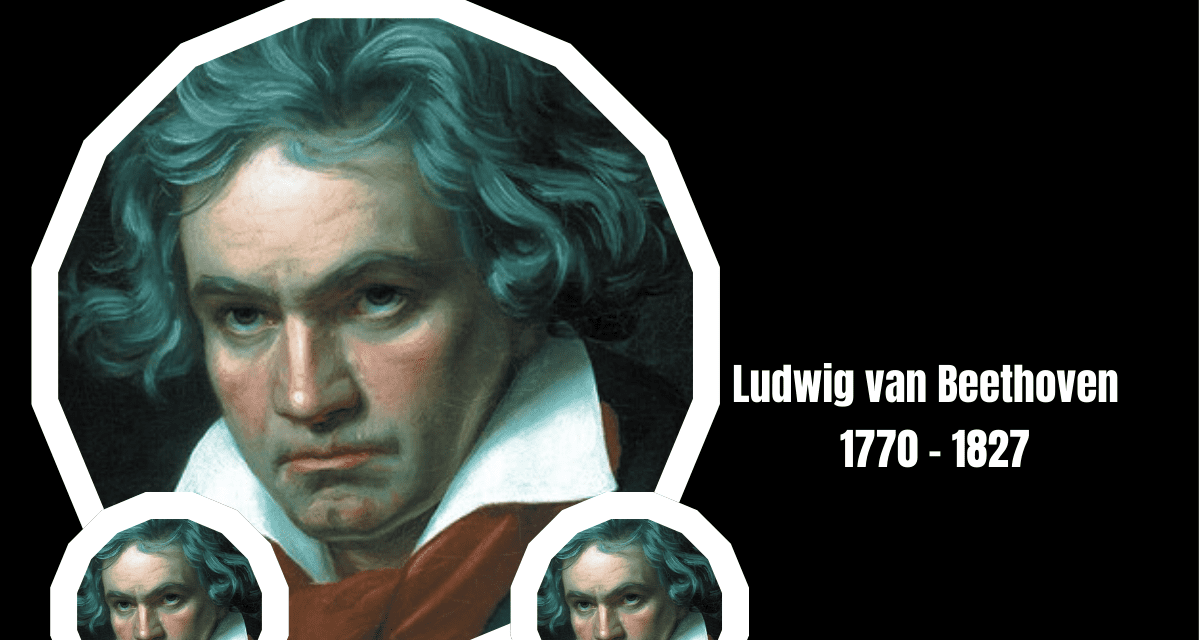Quick Facts
- Birth: December 17, 1770, Bonn, Germany
- Death: March 26, 1827, Vienna, Austria
- Notable Works: Symphony No. 5, Symphony No. 9, Moonlight Sonata, Missa Solemnis, Fidelio
- Family: He had a complex relationship with his father and supported his siblings after his mother’s death.
- Deafness: Began losing his hearing in his late 20s and composed some of his greatest works while almost completely deaf.
Early Life and Background
Ludwig van Beethoven was born on December 17, 1770, in Bonn, Germany, into a modest family. His father, Johann van Beethoven, was a court singer with a turbulent personality, often struggling with alcoholism. Johann noticed Ludwig’s early musical talent and envisioned turning him into a prodigy akin to Wolfgang Amadeus Mozart. From an early age, Beethoven endured his father’s strict and sometimes harsh training, which included late-night practice sessions. Despite these challenges, Beethoven developed a deep love and proficiency for music.
Beethoven’s early education was far from smooth. Though he demonstrated remarkable musical abilities, his formal schooling was inconsistent, resulting in lifelong difficulty with writing and arithmetic. However, Beethoven’s talent as a pianist and violinist was undeniable, and by age 10, he was already an assistant organist for the court chapel in Bonn, contributing financially to his family. Recognizing Beethoven’s potential, Christian Gottlob Neefe, the court organist, took him under his wing, providing guidance that would help shape Beethoven’s future.
The Move to Vienna and the Beginning of a Revolutionary Career
In 1792, Beethoven moved to Vienna, a city renowned for its vibrant musical scene and cultural sophistication. He had intended to study under Mozart, but unfortunately, Mozart passed away before this could happen. However, Beethoven did study with Joseph Haydn, a revered composer and a significant influence on Beethoven’s early compositions. While Haydn appreciated Beethoven’s skill, their relationship was somewhat strained due to Beethoven’s desire to push musical boundaries, an approach Haydn found unconventional.
Vienna welcomed Beethoven as a pianist, with his improvisational skills quickly capturing the attention of the city’s nobility. In particular, Beethoven’s ability to perform complex improvisations on the piano made him a sought-after performer in the salons and concert halls. His early works, such as the Piano Trios, Op. 1, and Pathetique Sonata, Op. 13, displayed a blend of emotional depth and technical brilliance that set him apart from his peers. These compositions helped him secure patrons among Vienna’s elite, who funded his work and provided him with social connections.
Challenges and Triumphs
Tragedy struck Beethoven in his late 20s when he began to lose his hearing—a devastating turn for any musician, especially one who thrived on performance. By his early 30s, Beethoven’s hearing had deteriorated significantly, leaving him in a state of despair. His famous Heiligenstadt Testament—a letter he wrote to his brothers in 1802—reveals the depth of his sorrow and frustration. He described how he had considered ending his life but ultimately chose to persevere, driven by his dedication to his art and the hope of creating something enduring.
Despite his deafness, Beethoven continued to compose, perform, and conduct. He adapted by using vibrations and his acute internal sense of sound, a method that allowed him to “hear” his compositions in his mind. His resilience during this period marked a turning point in his music. Beethoven began to embrace a bolder, more innovative style, evident in his Symphony No. 3, the “Eroica”, which broke traditional structures and introduced themes of heroism and struggle. This symphony marked the beginning of Beethoven’s middle period, often referred to as his “Heroic Period,” during which he produced works that emphasized emotional expression and complex structures.
Major Works and Contributions
Beethoven’s compositions during his “Heroic Period” reflect both his challenges and his desire to transcend them. Each piece was groundbreaking, contributing to the development of the Romantic era in music. Some of his most significant works include:
- Symphony No. 5 in C Minor: One of the most recognizable symphonies in Western music, known for its powerful four-note motif. The piece captures a journey from darkness to triumph, symbolizing Beethoven’s resilience.
- Symphony No. 9 in D Minor, “Ode to Joy”: Composed after he had become almost entirely deaf, this symphony incorporates a choral finale with Friedrich Schiller’s poem “Ode to Joy.” This final movement celebrates unity, freedom, and peace, making it an anthem for universal brotherhood. Symphony No. 9 stands as a symbol of Beethoven’s unbreakable spirit.
- Moonlight Sonata (Piano Sonata No. 14): Originally titled “Sonata quasi una fantasia,” this piece is known for its haunting, meditative first movement. The sonata showcases Beethoven’s ability to convey profound emotion through a simple yet evocative melody.
- Missa Solemnis: A sacred composition and one of Beethoven’s lesser-known masterpieces, the Missa Solemnis explores themes of spirituality and human connection. It remains a challenging and awe-inspiring piece for choirs and orchestras.
- Fidelio: Beethoven’s only opera, telling the story of a woman’s courage and sacrifice to save her husband from unjust imprisonment. The opera’s themes of love, justice, and resilience align closely with Beethoven’s personal beliefs.
Personal Struggles and Philosophical Beliefs
Beethoven’s life was marked by a series of personal hardships, including strained family relationships, unrequited love, and periods of financial instability. His intense personality and fierce independence often alienated him from those around him, but he held strong philosophical beliefs rooted in freedom, equality, and the power of the human spirit. Influenced by the Enlightenment ideals of his time, Beethoven saw music as a means to express universal truths and inspire moral and emotional growth.
Ludwig van Beethoven’s Net Worth
Ludwig van Beethoven, though highly celebrated in his time, did not accumulate a vast fortune by today’s standards. Adjusted for inflation, his net worth would likely be estimated at around a few hundred thousand dollars, with most of his income coming from aristocratic patrons, commissions, and public performances. Beethoven faced financial instability, especially in his later years, due to health issues and limited steady income sources, which was typical for composers of his era.
Legacy and Influence
Beethoven’s legacy as one of the greatest composers in history is unquestioned. His work bridged the Classical and Romantic eras, introducing new forms, emotional depth, and structural complexity. His influence can be traced to composers such as Franz Schubert, Johannes Brahms, and Gustav Mahler, all of whom drew inspiration from Beethoven’s innovations.
The enduring popularity of Beethoven’s music lies in its universality. His compositions transcend cultural and generational boundaries, resonating with audiences worldwide. The “Ode to Joy,” for instance, has been adopted as the anthem of the European Union and is performed during occasions that call for solidarity and celebration. Beethoven’s life story, marked by triumph over adversity, serves as a powerful reminder of the resilience of the human spirit.
Conclusion
Beethoven’s life and music exemplify the extraordinary power of human determination. His compositions continue to inspire, reminding us that creativity and passion can transcend physical limitations. Beethoven’s story is not merely one of musical genius but a testament to the triumph of will, resilience, and an unyielding commitment to art.





